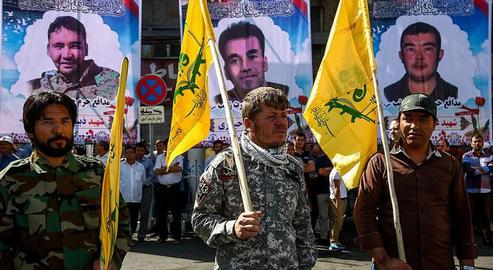The stories of former members of the Fatemiyoun Brigade who fought in Syria on behalf of the Islamic Republic of Iran are redolent with violence and frustration. The Fatemiyoun Brigade is one of the military branches of the Islamic Revolutionary Guard Corps’ Quds Force, and comprises Afghan citizens and migrants to Iran.
Some of them joined up voluntarily, but some were coerced or enlisted based on false promises such as legal residence permits for themselves and their families. Their lives on returning to Afghanistan are a living nightmare, threatened not merely by ISIS and the Taliban but by possible arrest by the Afghan government. Some Afghan officials and activists now fear the Islamic Republic is preparing to use the Fatemiyoun Brigade as a tool inside Afghanistan to further its own interests.
This report details the story of Mohammad, a young man from Ghazni province who has returned to Afghanistan and regrets having fought in Syria. Like many former members of the Fatemiyoun Brigade, he has asked to speak under a pseudonym.
***
Mohammad is 28 years old and fought in Syria in 2017 under the banner of the Fatemiyoun Brigade. Now living in Kabul, the capital of Afghanistan, he is still searching for a job. Like many former members of Fatemiyoun Brigade, he is worried about ISIS gaining power and fears he will be targeted by the terrorist group if his identity and past become known to them.
It was at the end of 2016 that Mohammad was first smuggled to Iran, hoping to support his family by working there. Like other Afghan migrants who enter Iran illegally, he first traveled to the border town of Nimrouz and after finding a smuggler and agreeing a fee – four million tomans, in his case – he was taken to Pakistan and crossed the Moshkel border into Iran.
Mohammad worked as a laborer on construction projects in Tehran – that was, until he was attracted by the promise of a salary of three million tomans with the Fatemiyoun Brigade. This job seemed to him to offer a sense of security. Afghan migrant workers in Iran also weather constant uncertainty and the threat of deportation, with municipal and law enforcement officials routinely inspecting building sites and either extorting money from the employers to keep their illegal workers, or detaining the Afghans and taking them back to the border.
Former members of the Fatemiyoun Brigade have also told IranWire that on being caught inside Iran, they were made to choose between going to war for the Islamic Republic or returning to Afghanistan. Many chose the former.
One week after registering his interest in joining up, Mohammad was contacted and transferred to a military barracks in Tehran. New members of his division received just 21 days of military training: "In this short period,” Mohammad says, “we learned how to use Kalashnikovs and grenades, and to build checkpoints, and so on.” He is reluctant to state the geographical location of the barracks, so afraid is he that he could be identified by the Islamic Republic. He says his Iranian commanders also ordered them to refrain from speaking to reporters or they would face “serious consequences”.
After Mohammad formally joined the Fatemiyoun Brigade, the Revolutionary Guards opened a bank account for him. Two months of fighting later, his first wage was paid: "I received 6 million tomans for two months in Damascus, and 1.8 million tomans for the 21 days of training. If I hadn’t been afraid of being forced backed home, I could have earned the same income as a worker."
Officials of the Islamic Republic had also promised Afghan refugees that they would be granted legal residency permits on joining the Fatemiyoun Brigade. "Before we went to war,” Mohammad says, “we were promised legal residency, the right to work and citizenship rights. We would be comfortable. But when we returned, the promises weren’t fulfilled. I was unemployed and was only given a one-month residence permit.”
Thousands of other Afghans signed up on the same false premise. And Mohammad says they were “abused” in Syria: “One night, 200 to 300 of our colleagues were wounded and killed, but only five members of the Syrian forces were killed. The governments of Iran and Syria abused us in the war. We didn’t receive advanced weapons, so our casualties were very high. Five of my close friends were killed and ten were injured. The number of dead and wounded was highest among us."
Now back in Afghanistan, Mohammed lives in constant fear. “This was the biggest mistake of my life. I should not have joined the war for fear of being returned to my country. Now, my life is all about the fear of being killed or arrested. We fought in support of Iran and Syria [the Syrian regime]. We were wrong to do so and now we cannot go back on our mistake."
This article was written by a citizen journalist under a pseudonym.
Related coverage:
Afghan Migrants in Iran Get a Simple Choice: Fight in Syria or be Deported
Revealed: How Border Guards and Officials Make a Killing from People-Smuggling in Iran
For Some Afghan Soldiers, Fighting in Syria was their Dream
Afghan Child Soldier in Syria Feels Lucky to be Alive
Iran Urged to Compensate Families of Afghan Child Soldiers
Will Soleimani's Death Intensify the Iran-US Proxy War in Afghanistan?
visit the accountability section
In this section of Iran Wire, you can contact the officials and launch your campaign for various problems


























comments